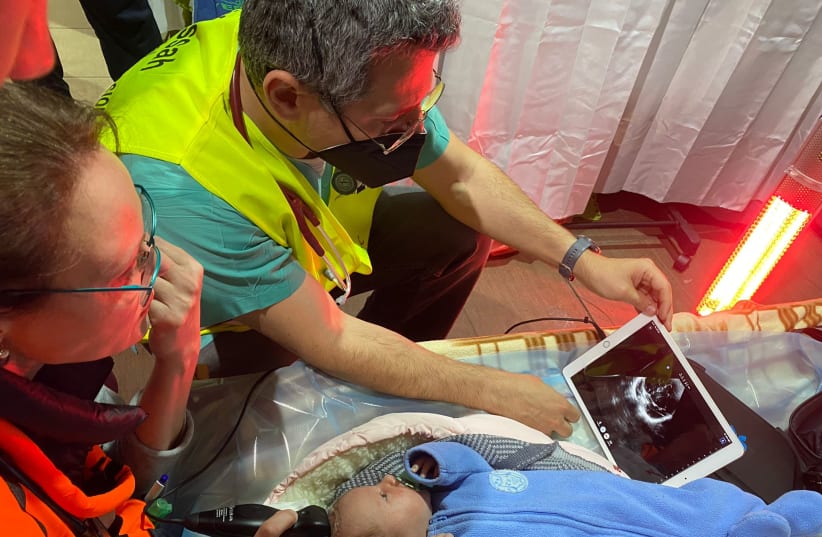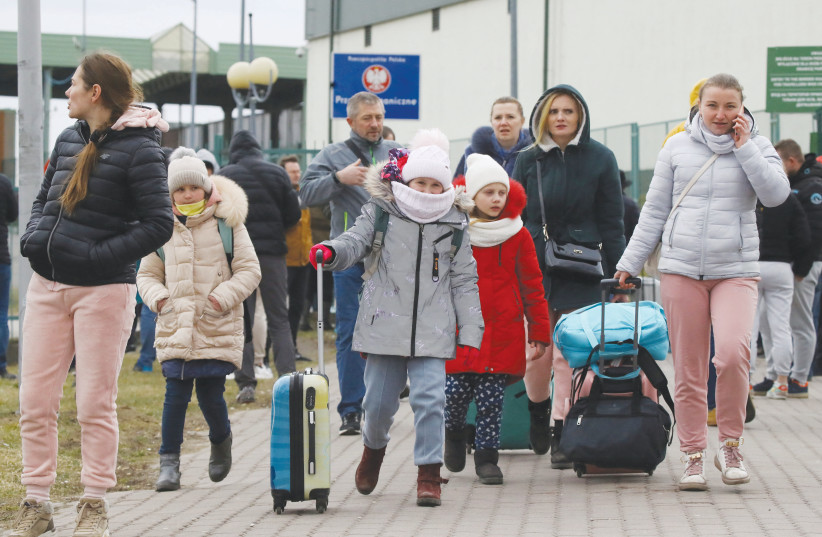The mother had spent two weeks in a dark Ukrainian cellar while air-raid sirens went off and missiles fell, sometimes even before the sirens sounded. Her husband, young enough to be conscripted, had to stay behind.
Their 12-year-old son, on the autism spectrum, could not understand what was happening.
By the time they got to Przemysl, the border city in southeastern Poland where refugees are camped, the son was uncontrollable.
That’s where I met them, in the clinic where Hadassah Medical Organization doctors and nurses joined the Polish Red Cross in giving medical care. I’m a pediatrician who specializes in lung diseases, from newborns to teens. I’m volunteering here to strengthen the medical services provided to fleeing Ukrainians in a mission sponsored by Hadassah’s supporters in the United States and around the world.
This mother was trying to hold it together, facing the most difficult transition of her life, and helpless to cope with her son, a hefty preteen, who was totally thrown by the changes in his routine and surroundings. She showed me the Ukrainian neurological records. We were able to prescribe medication for her son, to calm him down and to talk her through this crisis.
This is personal for me. I remember my own family’s departure from Belarus in the former Soviet Union when I was 10, my sister seven. Both of my parents were respected engineers, but their departure was delayed at the last minute when the Soviets ruled that they needed permission slips from their own parents to leave the country.
Then visa requirements were changed. Six months later, we arrived in Israel and settled in Netanya. I became a physician, combining everyday medical care and research with service through times of crisis. I live in Jerusalem and work in a hospital in Jerusalem that specializes in trauma.
Those of us whose families left the Soviet Union after the international struggle to free us Jews may feel a special connection to what’s happening in Ukraine. We remember the gates of the Soviet Union opening.
American friends tell me how they marched to let us go, spoke to their senators and set a plate at their Seder tables for their absent Soviet Union brethren, trapped behind the Iron Curtain. Some say they still think of that empty chair on Passover.
Although Hebrew is my first language now, at work and with my wife and three children, I’m still fluent in Russian, an asset in understanding and comforting the Ukrainian patients.
In my day job, I treat kids with asthma and cystic fibrosis, do research and run a pediatric sleep clinic at Hadassah. There’s little time to sleep in Przemysl. We’re treating a hundred patients a day in the refugee camp. We’re not healing war injuries or doing heroic surgery. A patient whom we diagnosed with appendicitis, for example, was sent to a hospital for an appendectomy. Mostly our patients are mothers with children and older residents.
Think of a mother who is violently throwing up, with her two kids who can’t stop vomiting either. They got sick in the dirty cellars with water shortages or on the crowded buses that carried them to the border. This mother doesn’t know which country will take them in. She needs to stop throwing up so she can think straight and take care of her children. But she also wants to tell her story to someone who can help. I feel privileged to help and to listen.
Questions sometimes extend beyond my pediatric medical field, so I consult other specialists at home. I text and send images to colleagues back at Hadassah in Jerusalem. They are all eager to help. They would all come if they could. Many of the older patients have run out of or forgotten medications for hypertension or diabetes. We can help them.
Tatiana, 40, is exhausted and weary. I would have guessed 50. I’m 42, so she’s younger than I am. War takes an immediate toll. She’s worried about her legs. I examine them. They’re both pink and bloated, with glossy brick red patches. I think back to the adult medicine I learned in medical school in Jerusalem. She has cellulitis but somehow I’m thinking heart failure. We have an electrocardiogram machine in the clinic. The ECG shows a possible heart attack.
Did she feel anything unusual, I ask this traumatized mother who had been sitting with her two children in a cellar in Zhitomir while her husband, now twice wounded, is fighting, and their home destroyed. Well, yes, she says, thinking back... she did feel chest pains and dizziness when the bombs were falling. She assumed it was a panic attack.
I want to evacuate her to the emergency room, but their bus for Berlin is leaving in two hours. I consult with an internist colleague from Hadassah who is treating other patients, then start her on antibiotics for the cellulitis, try to stabilize her blood pressure with medications and write a summary for her to give to the first emergency room physician she can get to in Germany.
The patients are appreciative to have their ills diagnosed and cared for.
I’m grateful, too, to be here, doing what I can. It’s tiny in contrast to the tragedy that surrounds me, but I cannot watch passively from afar.
The writer is a senior pediatric pulmonologist and sleep specialist at Hadassah Medical Organization in Jerusalem. He is among the Hadassah volunteers treating Ukrainian refugees in Poland. alexgi@hadassah.org.il

